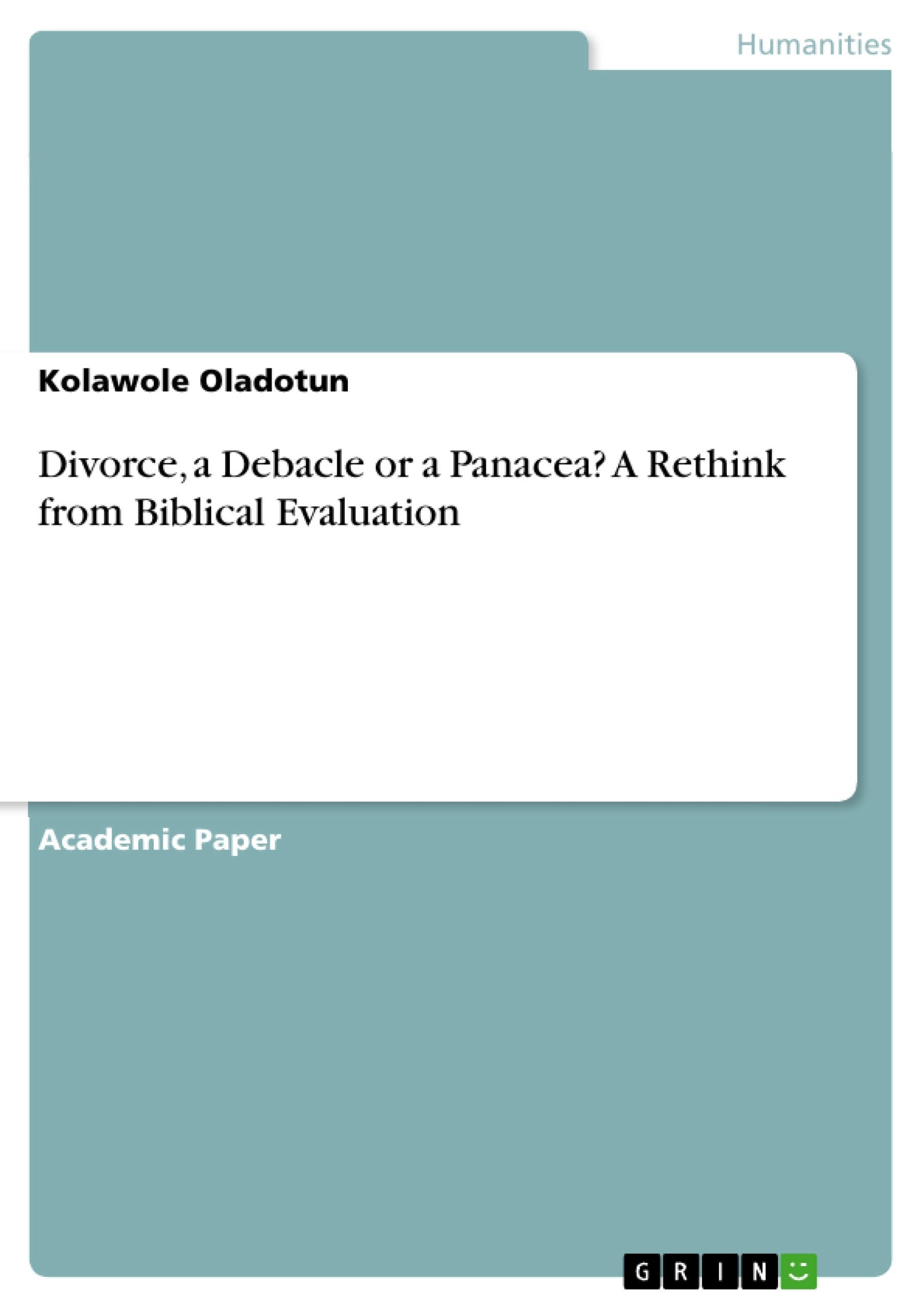Marriage is an integral part of man’s social life; a covenant and commitment between a man and woman. At a particular stage in life, people are questioned if they are not married. Yet, some people see the cure for unhappy marriage as separation (divorce), it’s often rather a problem than a solution; meanwhile, the society is heavily affected. Divorce remains a severe crisis; it inflicts pains on people concerned, children and the society at large. Many have seen the marriage covenant “till death do us part” as an unrealistic and obsolete phrase. Day by day majority of homes (especially the Christians) are faced with the threat of divorce in the contemporary society. People no longer take marriage serious with commitment for life. Divorce is the order of the day; people even say it with pride without remorse. In view of this, the research presents a discourse on the subject matter from a biblical evaluation revealing the true identity of divorce as a problem to Christian home.
Inhaltsverzeichnis (Table of Contents)
- Introduction: Statement of Problem
- Divorce: Old Testament Evaluation
- Divorce: New Testament Evaluation
- Biblical Evaluation: Divorce - A Debacle
- Divorce: Panacea or a Debacle
Zielsetzung und Themenschwerpunkte (Objectives and Key Themes)
This research paper aims to critically examine the concept of divorce from a biblical perspective, highlighting its problematic nature within the Christian context. It delves into the historical and theological foundations of divorce, analyzing the Old and New Testament perspectives on this issue.
- Biblical interpretation of divorce
- The impact of divorce on Christian families
- The theological implications of divorce
- The role of societal and cultural factors in divorce
- The ethical considerations surrounding divorce within a Christian framework
Zusammenfassung der Kapitel (Chapter Summaries)
- Introduction: Statement of Problem: This chapter introduces the research topic, focusing on the prevalence of divorce within contemporary society, particularly among Christians. It highlights the societal and emotional consequences of divorce, raising the question of whether divorce is truly a solution or a problem for Christian families.
- Divorce: Old Testament Evaluation: This chapter examines the perspective of the Old Testament on divorce. It highlights the notion of marriage as a permanent union, contrasting it with the permitted practice of divorce in specific circumstances outlined in Deuteronomy 24:1-4. It also addresses the debate surrounding the interpretation of “infidelity” as a grounds for divorce in the Old Testament.
- Divorce: New Testament Evaluation: This chapter focuses on the teachings of Jesus and the Apostles regarding divorce. It examines the stricter stance against divorce presented in the New Testament, contrasting it with the more lenient approach of the Old Testament.
- Biblical Evaluation: Divorce - A Debacle: This chapter presents a comprehensive argument against divorce from a biblical perspective. It discusses the negative consequences of divorce on individuals, families, and society as a whole. It explores the potential for healing and restoration within marriage and emphasizes the importance of commitment and perseverance.
Schlüsselwörter (Keywords)
The main keywords and focus topics of this research paper are divorce, marriage, biblical interpretation, Christian ethics, family values, social consequences, theological perspectives, and marital stability.
Frequently Asked Questions
What is the biblical view on divorce in the Old Testament?
While marriage is seen as a permanent union, the Old Testament (e.g., Deuteronomy 24:1-4) permitted divorce under specific circumstances, though it was not the ideal.
How did Jesus' teachings change the perspective on divorce?
In the New Testament, Jesus presented a stricter stance, emphasizing that what God has joined, man should not separate, highlighting the sanctity of the marriage covenant.
Is divorce considered a solution or a problem in this research?
The research presents divorce as a "debacle" (a problem) rather than a panacea, noting its negative impact on children, society, and the spiritual life of Christians.
What are the social consequences of divorce mentioned?
Divorce inflicts emotional pain on families, destabilizes the community, and often leads to a diminished view of lifelong commitment in society.
What does the "till death do us part" phrase signify today?
The paper discusses how many in contemporary society view this as obsolete, whereas the biblical evaluation reaffirms it as a vital life commitment.
- Citar trabajo
- Kolawole Oladotun (Autor), 2018, Divorce, a Debacle or a Panacea? A Rethink from Biblical Evaluation, Múnich, GRIN Verlag, https://www.grin.com/document/453861



